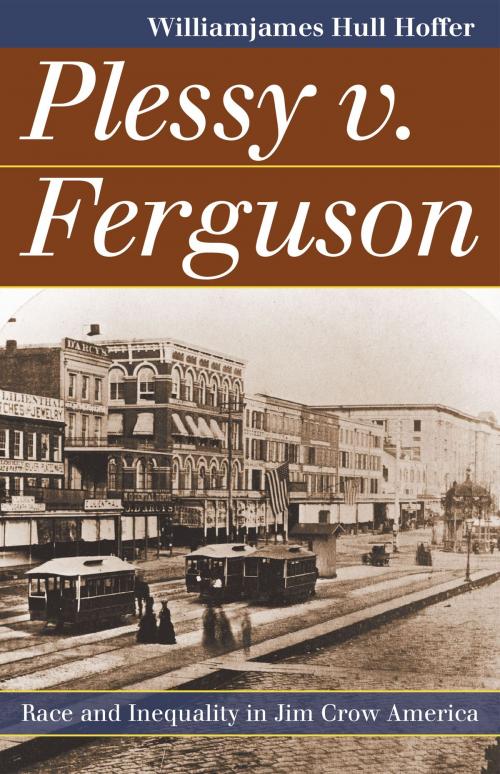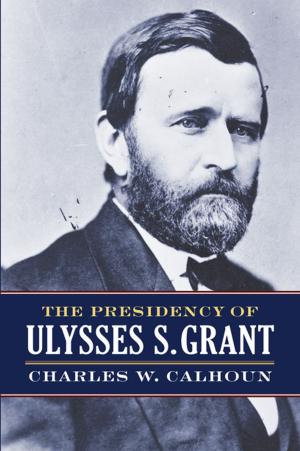Plessy v. Ferguson
Race and Inequality in Jim Crow America
Nonfiction, Reference & Language, Law, Legal History, Constitutional, Social & Cultural Studies, Political Science, Politics, Civil Rights| Author: | WilliamJames Hull Hoffer | ISBN: | 9780700622412 |
| Publisher: | University Press of Kansas | Publication: | April 16, 2012 |
| Imprint: | University Press of Kansas | Language: | English |
| Author: | WilliamJames Hull Hoffer |
| ISBN: | 9780700622412 |
| Publisher: | University Press of Kansas |
| Publication: | April 16, 2012 |
| Imprint: | University Press of Kansas |
| Language: | English |
Six decades before Rosa Parks boarded her fateful bus, another traveler in the Deep South tried to strike a blow against racial discrimination—but ultimately fell short of that goal, leading to the Supreme Court's landmark 1896 decision in Plessy v. Ferguson. Now Williamjames Hull Hoffer vividly details the origins, litigation, opinions, and aftermath of this notorious case.
In response to the passage of the Louisiana Separate Car Act of 1890, which prescribed "equal but separate accommodations" on public transportation, a group called the Committee of Citizens decided to challenge its constitutionality. At a pre-selected time and place, Homer Plessy, on behalf of the committee, boarded a train car set aside for whites, announced his non-white racial identity, and was immediately arrested. The legal deliberations that followed eventually led to the Court's 7-1 decision in Plessy, which upheld both the Louisiana statute and the state's police powers. It also helped create a Jim Crow system that would last deep into the twentieth century, until Brown v. Board of Education in 1954 and other cases helped overturn it.
Hoffer's readable study synthesizes past work on this landmark case, while also shedding new light on its proceedings and often-neglected historical contexts. From the streets of New Orleans' Faubourg Trem district to the justices' chambers at the Supreme Court, he breathes new life into the opposing forces, dissecting their arguments to clarify one of the most important, controversial, and socially revealing cases in American law. He particularly focuses on Justice Henry Billings Brown's ruling that the statute's "equal, but separate" condition was a sufficient constitutional standard for equality, and on Justice John Marshall Harlan's classic dissent, in which he stated, "Our Constitution is color-blind, and neither knows nor tolerates classes among its citizens."
Hoffer's compelling reconstruction illuminates the controversies and impact of Plessy v. Ferguson for a new generation of students and other interested readers. It also pays tribute to a group of little known heroes from the Deep South who failed to hold back the tide of racial segregation but nevertheless laid the groundwork for a less divided America.
Six decades before Rosa Parks boarded her fateful bus, another traveler in the Deep South tried to strike a blow against racial discrimination—but ultimately fell short of that goal, leading to the Supreme Court's landmark 1896 decision in Plessy v. Ferguson. Now Williamjames Hull Hoffer vividly details the origins, litigation, opinions, and aftermath of this notorious case.
In response to the passage of the Louisiana Separate Car Act of 1890, which prescribed "equal but separate accommodations" on public transportation, a group called the Committee of Citizens decided to challenge its constitutionality. At a pre-selected time and place, Homer Plessy, on behalf of the committee, boarded a train car set aside for whites, announced his non-white racial identity, and was immediately arrested. The legal deliberations that followed eventually led to the Court's 7-1 decision in Plessy, which upheld both the Louisiana statute and the state's police powers. It also helped create a Jim Crow system that would last deep into the twentieth century, until Brown v. Board of Education in 1954 and other cases helped overturn it.
Hoffer's readable study synthesizes past work on this landmark case, while also shedding new light on its proceedings and often-neglected historical contexts. From the streets of New Orleans' Faubourg Trem district to the justices' chambers at the Supreme Court, he breathes new life into the opposing forces, dissecting their arguments to clarify one of the most important, controversial, and socially revealing cases in American law. He particularly focuses on Justice Henry Billings Brown's ruling that the statute's "equal, but separate" condition was a sufficient constitutional standard for equality, and on Justice John Marshall Harlan's classic dissent, in which he stated, "Our Constitution is color-blind, and neither knows nor tolerates classes among its citizens."
Hoffer's compelling reconstruction illuminates the controversies and impact of Plessy v. Ferguson for a new generation of students and other interested readers. It also pays tribute to a group of little known heroes from the Deep South who failed to hold back the tide of racial segregation but nevertheless laid the groundwork for a less divided America.















